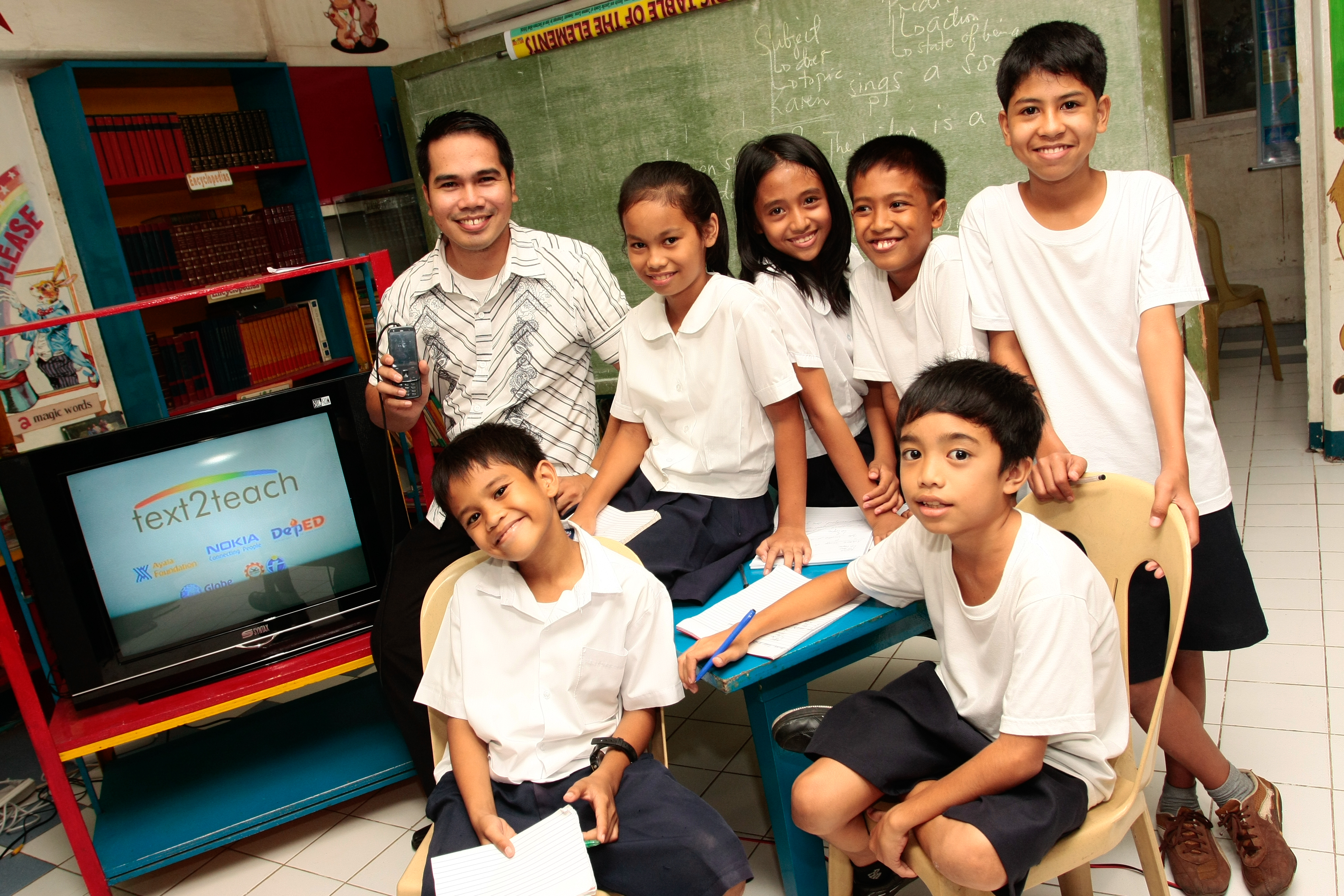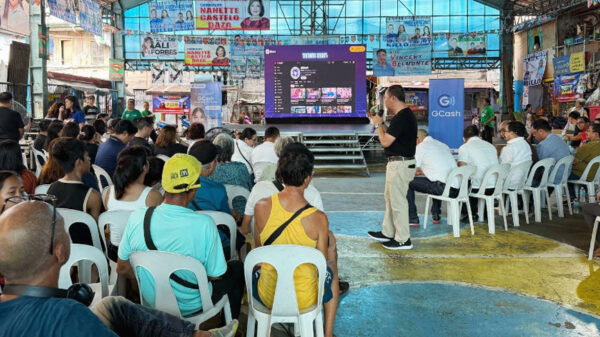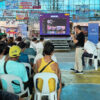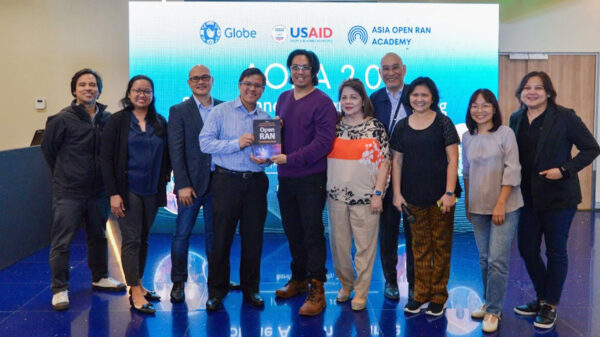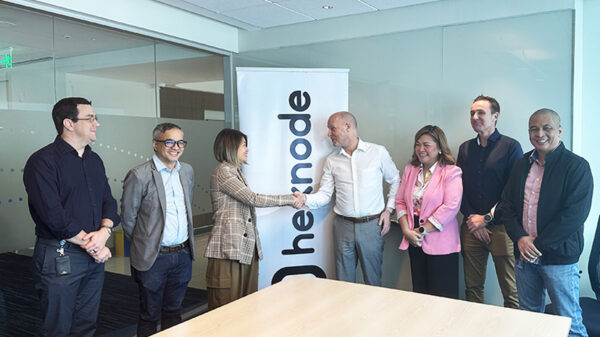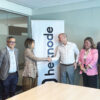For the past 10 years, about 309,402 grades 5 and 6 students from a total of 1,103 schools nationwide have benefited from a technology-enabled program that makes use of a mobile phone, cellular network connectivity and a television to deliver more than 300 educational video materials on Math, Science, English, and Values education.
The Text2Teach program, which celebrated its 10th anniversary on June 19, is actually the Philippine name of the global program BridgeIT conceptualized by Nokia, Pearson, the International Youth Foundation, and the United Nations Development Programme.
The Philippines has the longest-running Bridge IT program from among 12 countries in the world.
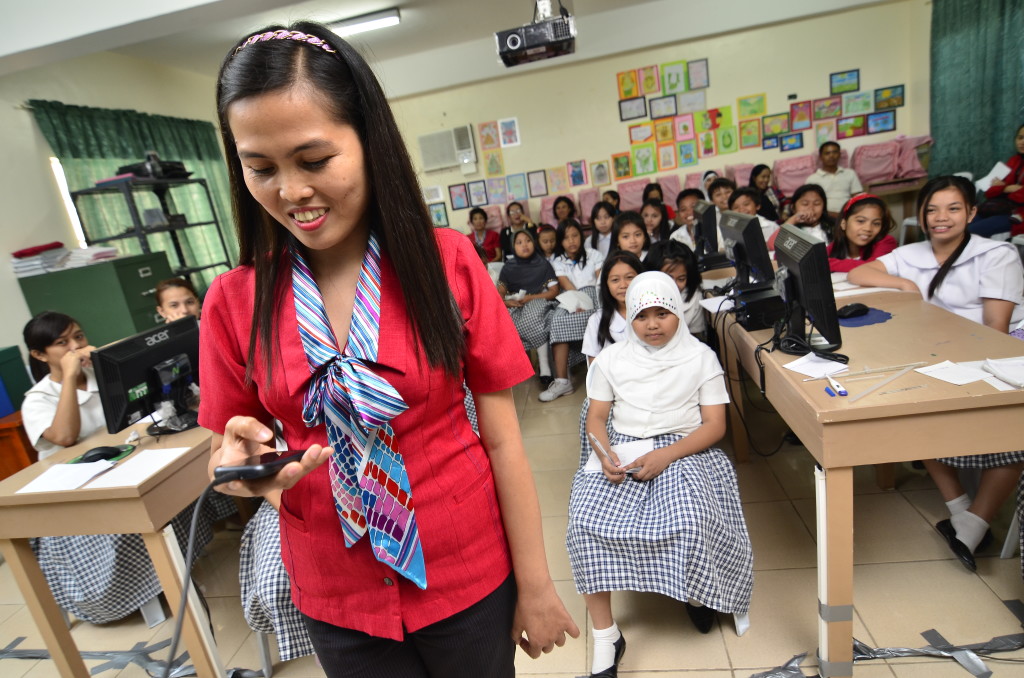
Educational video materials stored in Globe Telecom’s servers are downloaded by the teacher to a Nokia or Microsoft Windows phone via 3G connectivity.
“Millions currently do not have access to quality education worldwide, but there is a high possibility that their families have access to a mobile device,” said Sanna Eskelinen, Global Lead for Social Solutions, Microsoft.
In the Philippines, the program is carried out with the help of the Ayala Foundation, the Department of Interior and Local Government (DILG), the Department of Education (DepEd), Union of Local Authorities of the Philippines (ULAP) and Globe Telecom.
The program’s main platform is the Nokia Education Delivery, now known as Microsoft Education Delivery, which makes it possible for teachers and children to access content that would otherwise be out of their reach.
“Text2Teach has brought life to learning in our schools,” said Joy Navarra, ICT Coordinator of the Department of Education – Division of Ligao City in the Province of Albay. “It has aroused the interest of our learners and has decreased the absenteeism and dropout rates.” Navarra revealed that all 55 public schools in Ligao are already under the Text2Teach program.
Further down south, Text2Teach will be implemented in 15 elementary schools in Patikul, Sulu, one of the most remote island groups in the Philippines where student dropout rate has reached alarming proportions, this school year.
The alliance selected Patikul due to lack of core educational resources such as textbooks and regular teacher training in its public elementary schools which add to low quality learning in the classroom and a very high 50% drop out rate by end of primary schooling caused primarily by the low value accorded to education by both parents and students.
An evaluation of 179 schools from five provinces revealed that the Text2Teach program has decreased dropout rates from 42% to 24% in Grade; and from 34% to 16% in Grade 6. It has also increased promotion rates from 98.44% to 98.80% in Grade 5; and from 98.99% to 99.45% in Grade 6.
Text2Teach uses Lumia Devices installed with the Microsoft Education Delivery (MED) software application. MED harnesses mobile devices, networks, applications and cloud technology to deliver more than 300 educational video materials on grade 5 and 6 Math, Science, English, and Values Education even in remote communities. It comes with a Globe prepaid SIM and a 32-inch LED Toshiba TV that will play the videos for classroom use.
The materials are stored in Globe Telecom’s servers which are downloaded to a Windows phone via 3G connectivity.
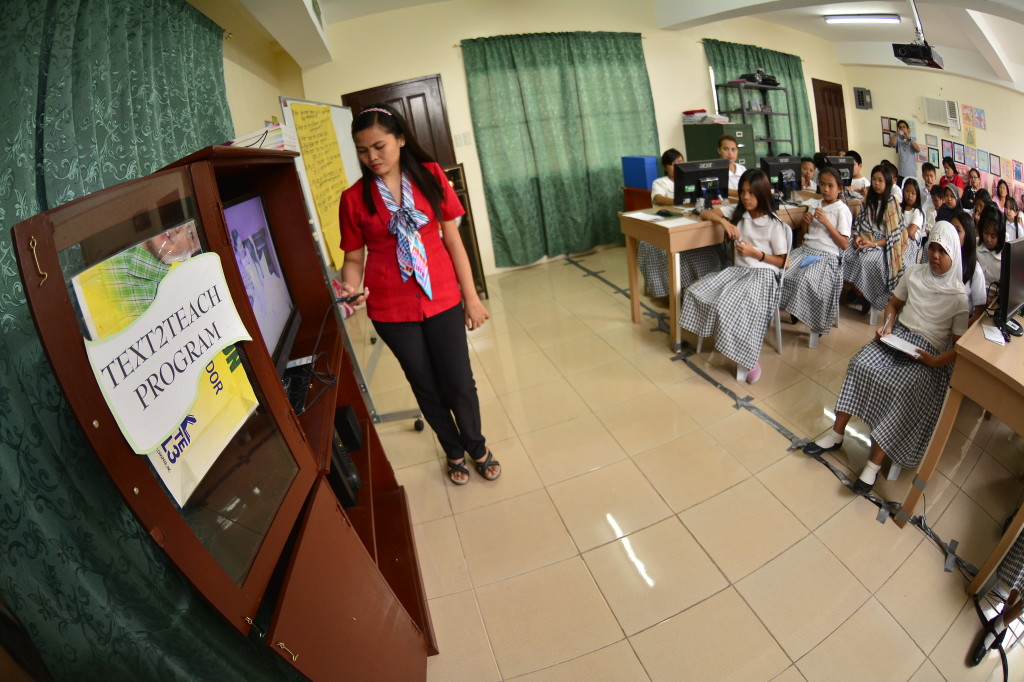
The phone is connected to a 32-inch LED television either through a cable connector or wireless display adapter. Through its mirroring function, teachers can wirelessly connect their phones to the television and play the Text2Teach videos.
Going mainstream
In line with its anniversary, the group behind the program have signed a commitment to mainstream Text2Teach, implementing it in all 38,000 public schools across the country. The mainstreaming of Text2Teach marks the fifth phase of the program.
To mainstream the program, Text2Teach will work closely with ULAP and the DILG in advocating and sharing the program with local government units. ULAP will hold advocacy workshops with LGUs and highlight the benefits of Text2Teach.
In addition to this, Ayala Foundation, with its aim to reach all public elementary schools in the Philippines, will conduct capability-building training sessions for all 203 local DepEd divisions, which in turn will train teachers in their respective areas to implement the Text2Teach program.
As part of its mainstreaming efforts, Text2Teach will also have all its materials and content available for DepEd teachers, through DepEd’s Learning Resource Management and Development System (LRMDS) portal. Videos, teaching guides, and other Text2Teach materials will be made available online as supplemental guides for teachers.
JR Demecaias, Education Lead for Programs at Ayala Foundation, Inc. said that the rollout will cost about Php120,000 per school, which covers teacher training, a TV set, and a Microsoft Lumia phone containing the Nokia Education Deliver (NED) materials.
Under the mainstreaming effort, Text2Teach will shift from providing direct program implementation in schools to empowering the local Department of Education-Divisions. This shift in approach will ensure that the Text2Teach standard process done by Ayala Foundation will be transferred to the local Department of Education-Division who has the direct supervision of the public elementary schools.
Text2Teach’s evolution
The Text2Teach technology evolved from the original satellite-based delivery used in Phase 1, to the NED developed by Nokia in Phase 3.
For Phase 4, Text2Teach will receive a system upgrade using Microsoft’s new devices. Text2Teach schools will be using Lumia Devices, which run on Windows OS8.1. The MED application where the Text2Teach videos are sent and stored will be updated with a new user-friendly interface. Additional features also include the ability to comment and ask questions about the media files.
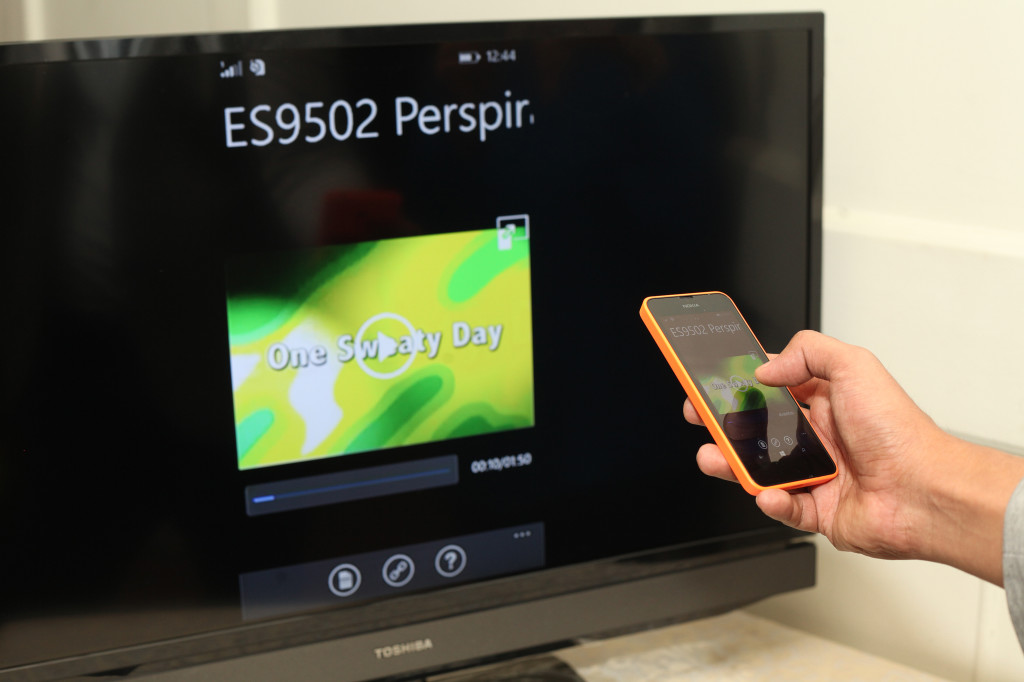
The Text2Teach program has more than 300 educational video materials on Math, Science, English, and Values education.
Text2Teach will also make use of the mirroring function of the Lumia Devices, with the help of a dongle connected to the television. This means that teachers no longer need to hook up the phone to the 32-inch LED Toshiba television through a cable connector. Through its mirroring function, teachers can wirelessly connect their phones to the television and play the Text2Teach videos.
Responding to UpgradeMag.com’s question on whether there are plans to incorporate tablet computing in the program, Eskelinen said the introduction of tablets “has yet to be discussed.”
Eskelinen believes that the education delivery system would only be effective if the device is controlled by the teacher.
As of today, appoximately 3,699 teachers are under the Text2Teach program which has improved teacher competence and attitudes towards using technology as a teaching tool.
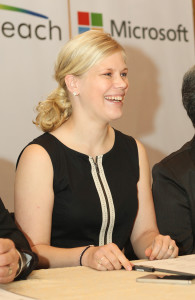
Sanna Eskelinen, Global Lead for Social Solutions, Microsoft: Millions right now do not have access to quality education worldwide, but there is a high possibility that their families have access to a mobile device.
Accolades
Last year BridgeIT was hailed by Nominet Trust, a UK funder for tech projects, as one of the 100 most inspiring social tech innovations. It was also identified as one of the ten “Exemplary Information Communications Technology Innovations for Education” at the Asia-Pacific Ministerial Forum on ICT in Education held at Shenzhen, China last 2013. This year, Text2Teach received a Merit Award for Best Community Program at the 6th Annual Global CSR Summit and Awards in Bali, Indonesia.
The use of Text2Teach has shown improvement in student’s performance and National Achievement Test scores. It has fostered positive attitudes towards learning and the use of technology for teaching. The program’s impact can be seen in disadvantaged schools, thus helping bridge the social gap. To date, Text2Teach covers a total of 78 cities and municipalities.
An evaluation of 179 schools from five provinces revealed that the Text2Teach program has decreased dropout rates from 42% to 24% in Grade; and from 34% to 16% in Grade 6. It has also increased promotion rates from 98.44% to 98.80% in Grade 5; and from 98.99% to 99.45% in Grade 6.
The program has also increased the average grades of the students by an average of 1% across all the four subjects.
Similar Initiatives
Microsoft is not the only technology vendor that has advocated the use of mobile technology in teaching and learning.
A tablet purposely created for use in schools has been developed by Intel Philippines.
Designed by Intel Education Solutions and sold institutionally, the Intel Education Tablet aims to transform the classroom by creating a collaborative and interactive learning and teaching environment where students are more engaged and teachers are more innovative in their method of instruction.
The tablet for schools is pre-installed with applications that aim to improve students’ performance in problem solving, reading comprehension, scientific analysis, and the arts.
Public schools in the country, specifically those in Makati and one in Davao, are using Intel Education Tablets to transform traditional classrooms to interactive learning hubs.
Marilog Central Elementary School is a public school located at Marilog Proper, Brgy. Marilog, Davao City. It is a rural school, situated in approximately 50 kilometers away from the city proper. The place has no electricity and has poor Internet connectivity.
As a beneficiary of the “Intel Solar Tablet in a Box Project” grant, the school received computer tablets, solar panel, battery charger and the Classroom Cloud Content (C3). Even without Internet connectivity, teachers can access the available resources from the C3 to teach a particular lesson in a subject.
According to MCES principal Zenaida Ayop, the tablets had a tremendous impact on the way their students and teachers viewed education. Majority of the students from MCES hail from different indigenous backgrounds, including Cebuano, Matigsalog, Tagabawa, Diangan, and Bagobo-Manobo tribes. The diverse student population, said some students, made it difficult for them to build relationships with their teachers and with each other.
“Before the grant, the students did not look forward to going to school. A number of them thought that school was not a fun place to be,” said Ayop. “After Intel gave us the Intel Education Tablets and trained our teachers how to use the devices, amazing changes started happening. The classroom became a bigger, friendlier, place – alive with questions and answers. Students are becoming more receptive to our lessons. We are also seeing improvement on their performance and retention of information.”
Public school students in Makati are also benefiting from the Intel Education Tablets. Just recently, the Department of Education in Makati acquired an initial 750 tablets as part of the city’s Php30 million school computerization project for 2013.
“We feel that this initiative is very timely, given the urgent call for engaging and interactive education in the country. We are optimistic that our investment in the Intel Education Tablet will help equip these students – who make up the next generation of the Filipino workforce – for the increasingly digital future and workplace,” said Dr. Dominico Idanan, Superintendent, Department of Education, Makati.
According to Idanan, Makati has 37 public schools, 2,730 teachers and 89,850 students. Idanan plans to give all the city’s teachers a laptop to improve their teaching skills.





















































































